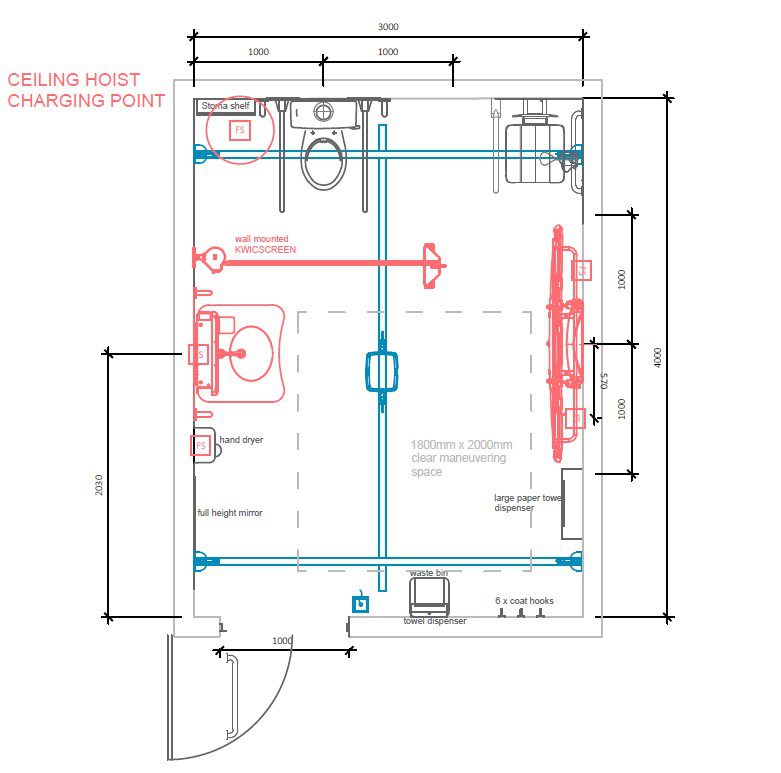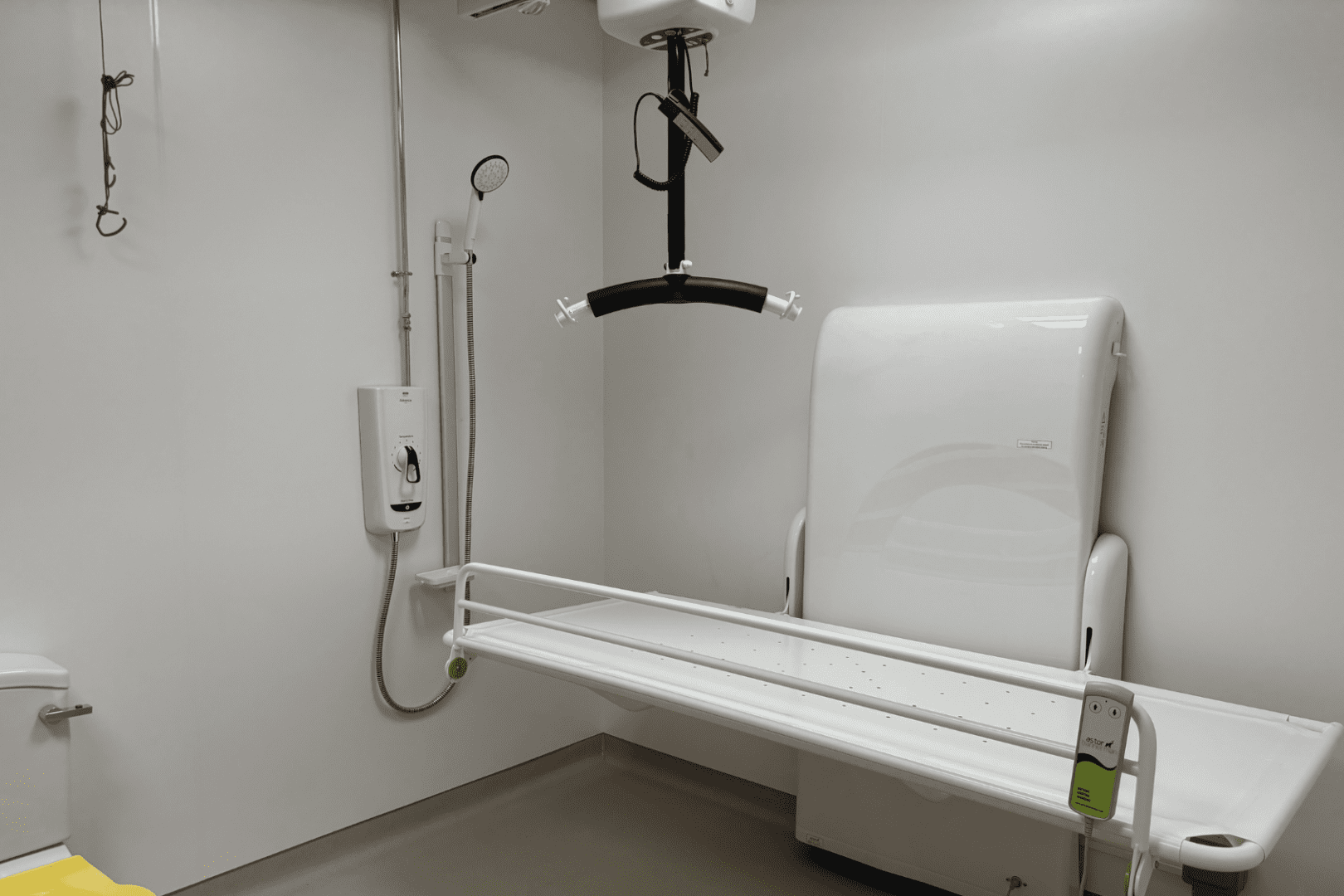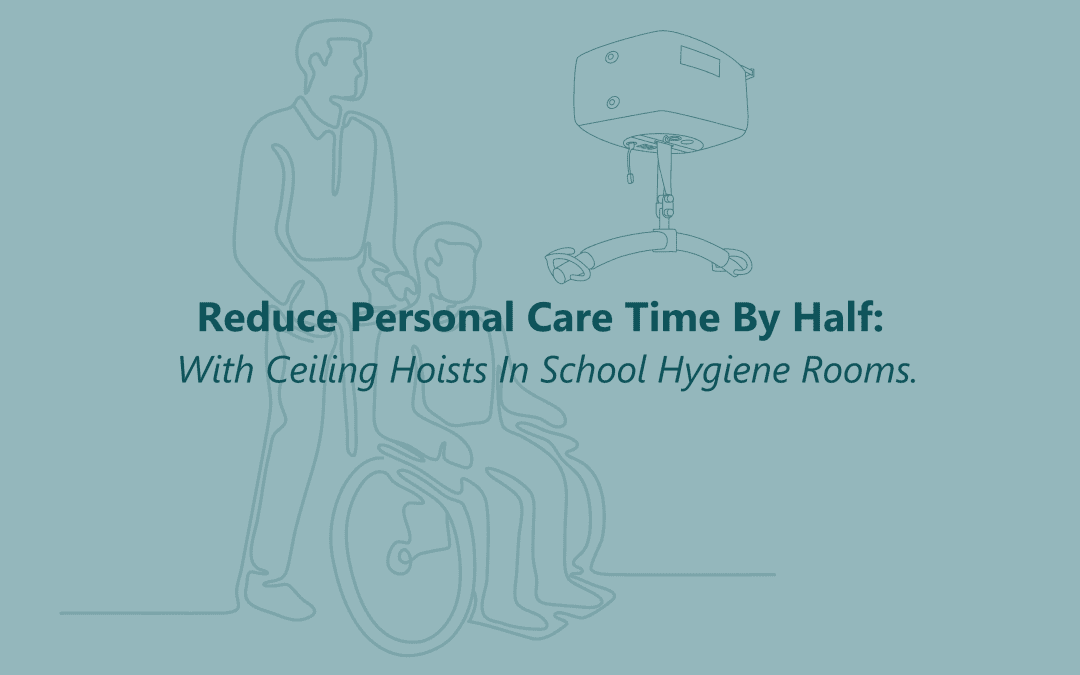Setting:
Equipment and Process:
Two carers assist the student using a mobile hoist.
The process involves:
- Positioning the hoist base under the wheelchair.
- Locking the hoist’s wheels for safety.
- Adjusting the sling and transferring the student to the changing table.
Average Time Taken Per Transfer:
15–20 minutes per session, including manoeuvring the mobile hoist in the confined space.
Average Total Time Per Day:
30–40 minutes (for two sessions).
Challenges:
- Manoeuvring the mobile hoist can be cumbersome in tight spaces.
- Locating & safe keeping of the hoist.
- Increased strain on carers due to repetitive adjustments.
- Students may feel discomfort due to prolonged handling time.

CEquipment and Process:
The ceiling-mounted XY hoist provides complete room coverage, eliminating the need to reposition equipment manually.
The process involves:
-
- Positioning and attaching the sling to the hoist.
- Using the motorised hoist to transfer the student directly to the changing table or toilet without adjusting the hoist’s position.
Average Time Taken Per Transfer:
5–7 minutes per session, as the ceiling hoist allows direct, smooth transitions without manual repositioning.
Average Total Time Per Day:
10–14 minutes (for two sessions).
Benefits of the Ceiling Hoist:
- Full room coverage means the hoist can move in any direction, avoiding the challenges of mobile hoists or track limitations.
- Fewer adjustments are required, resulting in faster and safer transfers.
- Ceiling mounted out of harms way.

Overall Time Savings with the Ceiling Hoist
→ Average time saved per transfer: 8–13 minutes.
→ Average time saved per day: 16–26 minutes.
→ Average over a week (5 school days): 80–130 minutes (1.3–2.2 hours)
Broader Benefits of the Ceiling Hoist
For Students:
-
- Greater dignity and comfort due to smoother and faster transfers.
- Less waiting time, reducing anxiety and improving overall experience.
For Carers:
-
- Reduced physical strain and risk of injury.
- More time to assist with educational or social activities.
For Schools:
-
- Enhanced workflow in the Hygiene Room, increasing the capacity to support multiple students.
- Compliance with accessibility standards, ensuring future-proofing for other students with mobility needs.



Benefits of Hygiene Rooms for Schools
Hygiene Rooms are essential for providing dignified and efficient care for students with complex physical needs. They ensure students can access toileting and personal care safely and comfortably, while also reducing the physical strain on carers.
Additionally, they future-proof schools by meeting compliance standards, enhancing accessibility, and demonstrating a commitment to equality.

The Value of Early Consultation
Engaging in early consultation with specialists can prevent costly oversights and ensure that facilities are precisely aligned with BB103 and BB104 standards.
Our CPD sessions provide architects with practical insights on accessible hygiene facilities, from selecting the right equipment to planning effective layouts in schools.
By connecting with experts early in the process, architects can ensure that their designs support inclusive education while maintaining budget and clarity for developers.
Read more about the structural challenges of installing a hoist and how we overcome them here.
Case Studies
Ready to Get Started?
If you’re planning to incorporate a Hygiene Room in a school project, our team at Astor Bannerman is here to guide you through each step to ensure it meets all relevant standards and optimally serves students’ needs.
Contact us to arrange a no-obligation consultation with our Hygiene Room specialists, and let’s work together to create accessible, cost-effective spaces that support inclusive education and align with BB103 and BB104 guidelines.





